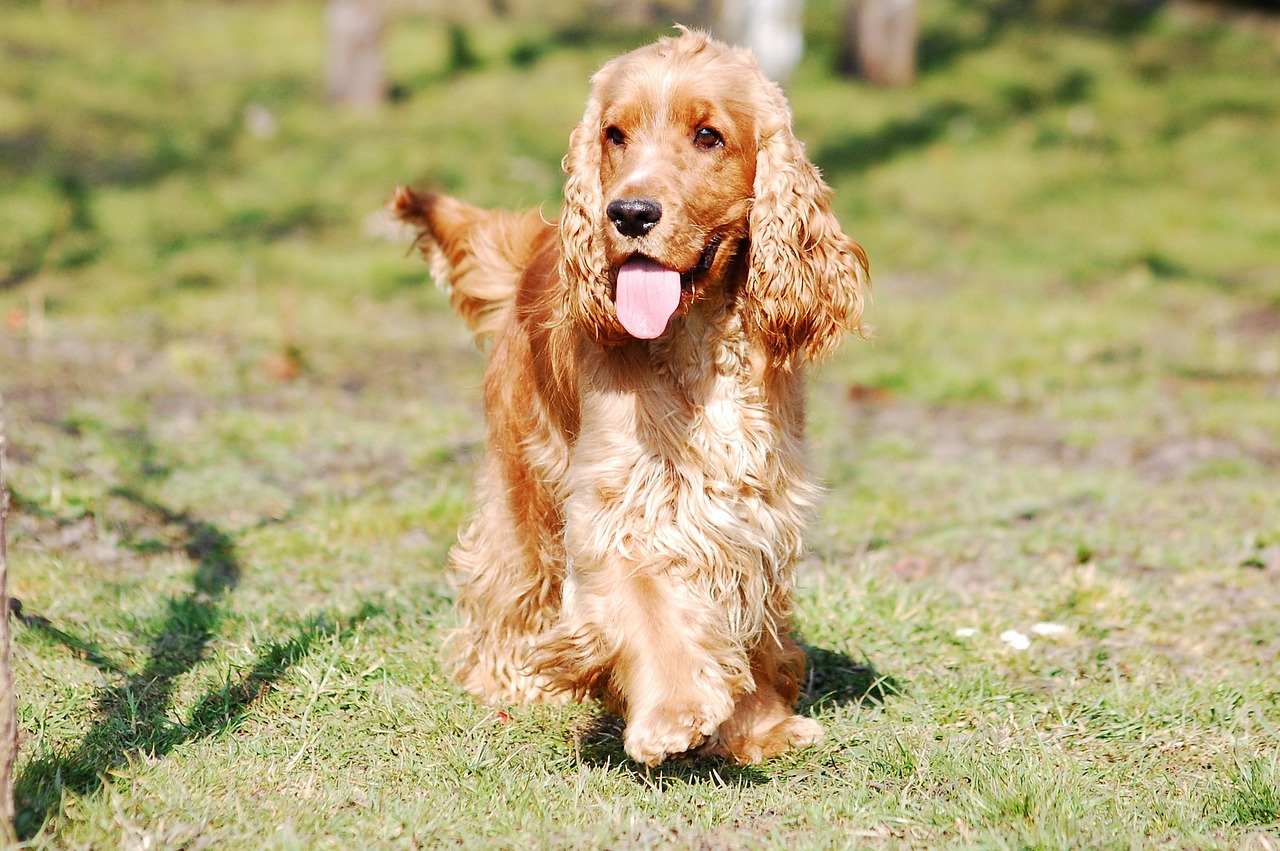The Cocker Spaniel, with its soulful eyes and luxurious coat, is a breed beloved by many across the globe. However, beyond their endearing looks lies a temperament equally captivating. This article delves into the nine core traits that define a Cocker Spaniel’s personality.
1. Affectionate and Loyal
A defining trait of the Cocker Spaniel is its boundless affection. These dogs form tight-knit bonds with their human families, displaying loyalty that’s hard to match. Their penchant for cuddling, combined with a desire to be close to their owners, makes them the quintessential lap dog and a delightful companion.
2. Sensitive and Empathetic
Cocker Spaniels are notably sensitive creatures. They seem to possess an innate ability to sense the emotions of those around them, often adjusting their behavior in response. This sensitivity, though endearing, means they respond best to positive reinforcement techniques and require a gentle hand in training.
3. Active and Energetic
Originally bred for hunting, the Cocker Spaniel is an active breed with a notable zest for life. Regular exercise, be it through walks, fetch sessions, or agility training, is essential to keep them mentally and physically stimulated.
4. Social and Friendly
These Spaniels are social butterflies. With proper socialization from a young age, they usually get along well with other pets, children, and even strangers. Their friendly disposition makes them great additions to households with multiple pets and ensures they’re the star of the show during social gatherings.
5. Intelligent but Sometimes Stubborn:
Their keen intelligence can sometimes be a double-edged sword. While Cocker Spaniels pick up on commands and tricks with ease, they can also be a tad stubborn, especially if they sense they can get away with mischief. Consistent training from puppyhood is crucial.
6. Adaptable to Living Situations
Whether residing in a city apartment or sprawling countryside estate, Cocker Spaniels adapt with ease. Their moderate size and temperament make them versatile companions, suitable for various living environments as long as their exercise needs are met.
7. Alert and Curious
Cocker Spaniels are naturally alert and inquisitive. They’re quick to notify their owners of any unusual noises or happenings. This alertness, coupled with their friendly nature, means they’re more likely to greet intruders with a wagging tail rather than a growl.
8. Requires Human Interaction
A Cocker Spaniel is not a breed that enjoys being left alone for extended periods. Their deep attachment to their human families and their active nature means they crave interaction and activity. Long periods of solitude can lead to destructive behaviors or separation anxiety.
9. Tendency Towards Vocalization
While not incessant barkers, Cocker Spaniels are known to vocalize. Whether through barking at the doorbell, whining for attention, or merely expressing their feelings, potential owners should be prepared for a dog that’s not always silent.
The Cocker Spaniel, with its myriad of traits ranging from affectionate loyalty to keen alertness, offers a rich and rewarding companionship. Their needs, primarily centered around human interaction, exercise, and training, are a small price to pay for the love and joy they infuse into a home. For those willing to understand and cater to the Cocker Spaniel temperament, the bond formed is one of deep affection and mutual respect. Like any breed, they come with their quirks, but the love of a Cocker Spaniel is unwavering and vast, making them cherished pets in homes worldwide.
How Does a Male Cocker Spaniel Temperament Compare to a Female Cocker Spaniel?
Male Cocker Spaniel Temperament:
1. Dominant Nature
Male Cocker Spaniels often display a more dominant and confident temperament compared to females. While not aggressive, they like to establish themselves as the ‘alpha’ and may require a firm hand in training to encourage obedience and respectful behavior.
2. Consistent Affection
Males are typically affectionate and loving towards their owners. Their demeanor is often steady, providing consistent companionship and loyalty to their human families. They enjoy cuddles and often seek attention, making them excellent companions.
3. Territorial Instincts
Being territorial, male Cocker Spaniels may be more protective of their environment. Early socialization is crucial to prevent excessive protectiveness or anxiety, ensuring they are comfortable with new people and pets entering their space.
Female Cocker Spaniel Temperament:
1. Independent and Reserved
Females tend to be more independent than their male counterparts. While they are affectionate and loyal, they might not constantly seek attention, being content with spending some time alone. This independence can sometimes be mistaken for aloofness or reserve.
2. Maternal Instinct
With strong maternal instincts, female Cocker Spaniels are often protective of their family members. They are vigilant and alert to potential threats, making them excellent watchdogs. This protective nature is usually more pronounced in females than males.
3. Responsive to Training
Often, female Cocker Spaniels respond well to training, showing a keen understanding and quick learning of commands and tricks. Their independent nature can make them slightly less eager to please than males, but they are generally cooperative and trainable.
While male Cocker Spaniels might offer steady affection and a playful demeanor, females may provide calm, independent companionship. The choice between a male or female depends largely on the owner’s preference and lifestyle. Each dog’s individual personality, the training they receive, and the environment in which they are raised play significant roles in their behavior and temperament. Regardless of gender, Cocker Spaniels are known for their loving and gentle nature, making them fantastic companions for various households. With understanding and commitment, owning a Cocker Spaniel, whether male or female, is a rewarding experience filled with affection and joy.
Frequently Asked Questions about a Cocker Spaniel‘s Temperament and Personality
 1. How affectionate are Cocker Spaniels?
1. How affectionate are Cocker Spaniels?
Cocker Spaniels are exceptionally affectionate dogs, forming deep bonds with their owners. They love giving and receiving attention, making them excellent companions for families, singles, and seniors alike.
2. Are Cocker Spaniels good with children?
Yes, Cocker Spaniels typically get along well with children, thanks to their gentle and playful nature. However, it’s essential to teach children how to properly interact with dogs to ensure a safe and positive relationship between them.
3. Can Cocker Spaniels adapt to apartment living?
Cocker Spaniels can adapt to apartment living as long as they receive sufficient exercise and mental stimulation. Their moderate size and relatively calm indoor demeanor make them suitable for various living situations.
4. Do Cocker Spaniels get along with other pets?
With proper socialization, Cocker Spaniels usually get along well with other pets. Introducing them to various animals at a young age can foster a peaceful and amicable relationship between them and other pets in the household.
5. Are Cocker Spaniels easy to train?
Their intelligence and eagerness to please make Cocker Spaniels relatively easy to train. Consistent, positive reinforcement methods work best, as they respond poorly to harsh training techniques due to their sensitive nature.
6. How much exercise do Cocker Spaniels need?
Cocker Spaniels are active and require regular exercise to maintain their physical and mental health. Daily walks, play sessions, and some off-leash time in secure areas are usually sufficient to keep them happy and healthy.
7. Can Cocker Spaniels be left alone for long periods?
Given their affectionate and social nature, Cocker Spaniels shouldn’t be left alone for extended periods. Long durations of solitude can lead to separation anxiety and resultant behavioral issues.
8. Do Cocker Spaniels bark a lot?
Cocker Spaniels can be quite vocal, often barking at strangers or unfamiliar noises. Training from an early age can help manage excessive barking.
9. Are Cocker Spaniels hypoallergenic?
No, Cocker Spaniels are not hypoallergenic. They shed moderately, so they might not be the best option for individuals with severe allergies.
10. How do male and female Cocker Spaniels differ in temperament?
Male Cocker Spaniels tend to be more affectionate and attention-seeking, while females might be somewhat independent and reserved. However, individual personalities may vary, and proper socialization and training play a significant role.
11. Are Cocker Spaniels aggressive?
Cocker Spaniels are not inherently aggressive. However, like all breeds, they require socialization and training to promote well-adjusted behaviors. Improper handling or neglect can lead to behavioral issues in any dog.
12. Is it challenging to groom a Cocker Spaniel?
Cocker Spaniels require regular grooming due to their long, silky coats. Regular brushing, ear cleaning, and professional grooming sessions are necessary to keep their coat healthy and prevent matting.
13. How long do Cocker Spaniels live?
The average lifespan of a Cocker Spaniel ranges from 12 to 15 years. Proper care, a healthy diet, regular exercise, and regular veterinary check-ups can contribute to a longer and healthier life.
14. Are Cocker Spaniels good hunting dogs?
Originally bred as bird dogs, Cocker Spaniels still possess a strong hunting instinct and excel in various hunting and field activities. Their keen sense of smell and high trainability make them effective hunting companions.
15. What are common health issues in Cocker Spaniels?
Cocker Spaniels are prone to certain health issues, including ear infections due to their floppy ears, hip dysplasia, cataracts, and progressive retinal atrophy. Regular veterinary check-ups and a healthy lifestyle can help mitigate these risks.
What Kind of Person Is a Good Fit for a Cocker Spaniel?

Cocker Spaniels are known for their gentle and affectionate nature. However, they are not a one-size-fits-all breed. Below, we outline the types of individuals and families that are typically well-suited for life with a Cocker Spaniel.
1. Active Individuals or Families
Cocker Spaniels have a moderate to high energy level. Individuals or families who lead an active lifestyle and can provide them with the exercise they need, such as daily walks, play sessions, and regular opportunities to run, are ideal for these lively dogs.
2. Those With Time for Grooming
With their long, silky coats, Cocker Spaniels require a significant amount of grooming. Individuals who have the time, patience, and resources to dedicate to regular grooming—or those willing to pay for professional grooming services—are the best fit.
3. Families With Children
Gentle and playful, Cocker Spaniels usually get along well with children. However, it’s crucial that children are taught to treat animals respectfully, as these dogs can be sensitive.
4. First-Time Dog Owners
Their trainable and adaptable nature makes Cocker Spaniels a good choice for first-time dog owners. They are responsive to consistent, positive reinforcement training, making the experience enjoyable for both the pet and the owner.
5. Those Looking for a Companion
If you’re seeking a loyal and affectionate companion, the Cocker Spaniel might be the right fit. These dogs form strong bonds with their owners and offer unwavering companionship.
6. Multiple Pet Households
Cocker Spaniels often get along well with other pets, especially when socialized from a young age. Households with other dogs or even cats might find that a Cocker Spaniel integrates well.
7. Individuals With Enough Time
As they crave human interaction, Cocker Spaniels do best in households where someone is frequently home. They are not a breed that tolerates being left alone for extended periods well, and prolonged loneliness can lead to anxiety and depression.
8. Patient Trainers
While they are intelligent and generally eager to please, Cocker Spaniels can sometimes be a bit stubborn. Individuals who are patient and willing to invest time in consistent training will find the most success.
Cocker Spaniels, with their friendly and adaptable temperament, can fit into a wide variety of homes and lives. Their needs, primarily surrounding exercise, grooming, and companionship, should align with what a potential owner or family can offer. Those who can meet these needs will find a loving, loyal, and joyful companion in a Cocker Spaniel, making the investment of time and care well worth it.
 Toledo, United States.
Toledo, United States.